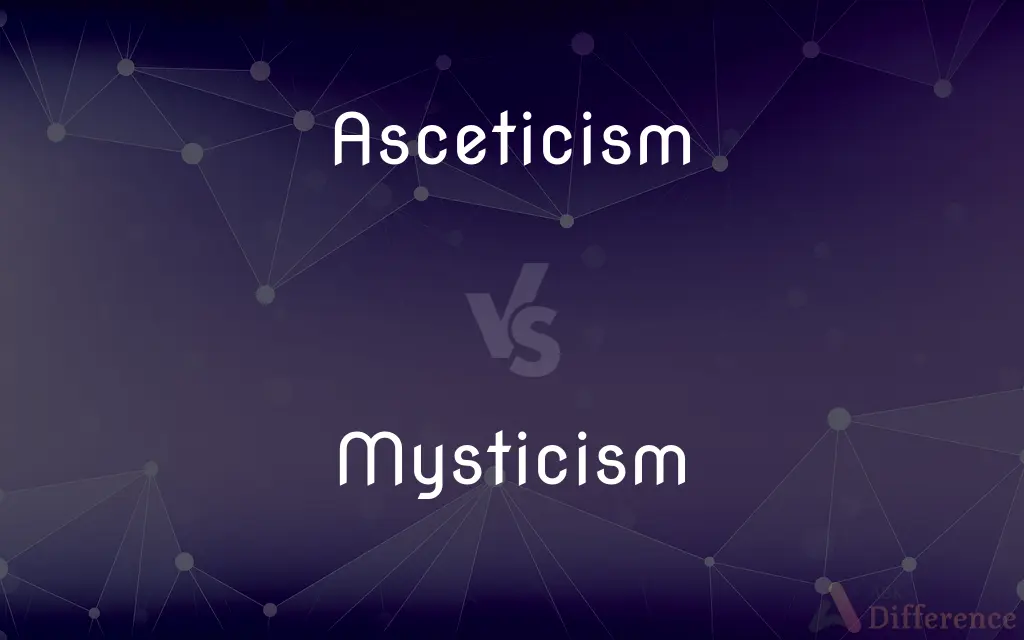Asceticism vs. Mysticism — What's the Difference?
By Maham Liaqat & Fiza Rafique — Updated on March 11, 2024
Asceticism involves self-discipline and abstention from indulgence, while mysticism focuses on spiritual union with the divine.

Difference Between Asceticism and Mysticism
Table of Contents
ADVERTISEMENT
Key Differences
Asceticism is a lifestyle characterized by self-denial and abstention from various forms of physical pleasure, often for religious or spiritual reasons. Practitioners, known as ascetics, might engage in fasting, celibacy, and simplicity in living to achieve a higher spiritual state or self-purification. On the other hand, mysticism involves a direct, personal experience of the divine or ultimate reality. Mystics seek to transcend ordinary human consciousness and experience a union with the divine through meditation, prayer, and other contemplative practices.
While both asceticism and mysticism aim for spiritual elevation, their methods and focus differ significantly. Asceticism emphasizes renunciation of worldly pleasures and self-discipline as a path to spiritual growth, viewing physical desires as distractions from spiritual goals. Mysticism, however, focuses on internal experiences and the direct encounter with the divine, often regarding these experiences as ineffable and beyond the realm of ordinary understanding.
Ascetic practices can be found in many religious traditions, including Christianity, Buddhism, Hinduism, and Islam, serving as a means to purify the body and mind to achieve spiritual insight or closeness to the divine. Mysticism also crosses religious boundaries, with mystics in different traditions experiencing and describing their encounters with the divine in various ways, highlighting the universal human quest for a deeper spiritual connection.
The relationship between asceticism and mysticism can be complex, as some mystics may adopt ascetic practices to facilitate their spiritual experiences. However, not all ascetics are mystics, and not all mystics practice asceticism. The essential difference lies in asceticism's focus on self-discipline and renunciation, while mysticism seeks a direct experience or union with the divine.
Both asceticism and mysticism offer paths to spiritual depth and understanding, each with its own set of practices, beliefs, and goals. While asceticism provides a disciplined approach to spirituality through the denial of physical desires, mysticism offers a direct, experiential approach to encountering the divine.
ADVERTISEMENT
Comparison Chart
Focus
Self-discipline, abstention from indulgence
Spiritual union, direct experience of the divine
Practices
Fasting, celibacy, simplicity
Meditation, prayer, contemplation
Purpose
Purification, spiritual growth
Direct encounter with the divine
Religious Traditions
Christianity, Buddhism, Hinduism, Islam
Crosses religious boundaries
Relation to the Divine
Indirect, through purification and discipline
Direct, through personal experience
Compare with Definitions
Asceticism
Self-denial.
Ascetics live simply, often foregoing luxuries for spiritual reasons.
Mysticism
Spiritual Union.
Mystics seek a direct connection with the divine through contemplative practices.
Asceticism
Purification.
Ascetics may abstain from physical pleasures to purify their bodies and souls.
Mysticism
Universal Quest.
Mysticism represents the universal human quest for a deeper spiritual connection.
Asceticism
Discipline.
Ascetic practices like fasting are used to discipline the body and mind.
Mysticism
Direct Experience.
Mystical experiences often transcend ordinary consciousness, providing a personal encounter with the divine.
Asceticism
Spiritual Growth.
Through asceticism, individuals seek to grow spiritually by renouncing worldly pleasures.
Mysticism
Inner Journey.
Mysticism emphasizes the internal, spiritual journey over external practices.
Asceticism
Worldly Renunciation.
Asceticism involves renouncing worldly desires to focus on spiritual goals.
Mysticism
Ineffable Encounters.
Mystics describe their encounters with the divine as beyond ordinary language and understanding.
Asceticism
Asceticism (; from the Greek: ἄσκησις, romanized: áskesis, lit. 'exercise', 'training') is a lifestyle characterized by abstinence from sensual pleasures, often for the purpose of pursuing spiritual goals. Ascetics may withdraw from the world for their practices or continue to be part of their society, but typically adopt a frugal lifestyle, characterised by the renunciation of material possessions and physical pleasures, and also spend time fasting while concentrating on the practice of religion or reflection upon spiritual matters.
Mysticism
Mysticism is popularly known as becoming one with God or the Absolute, but may refer to any kind of ecstasy or altered state of consciousness which is given a religious or spiritual meaning. It may also refer to the attainment of insight in ultimate or hidden truths, and to human transformation supported by various practices and experiences.The term "mysticism" has Ancient Greek origins with various historically determined meanings.
Asceticism
Severe self-discipline and avoiding of all forms of indulgence, typically for religious reasons
Acts of physical asceticism
Mysticism
Belief in direct experience of transcendent reality or God, especially by means of contemplation and asceticism instead of rational thought.
Asceticism
The principles and practices of an ascetic; extreme self-denial and austerity.
Mysticism
Such experience had by an individual.
Asceticism
The doctrine that the ascetic life releases the soul from bondage to the body and permits union with the divine.
Mysticism
Belief in the existence of realities beyond perceptual or intellectual apprehension that are directly accessible by subjective experience
Belief in séances, astral projection, and similar mysticism.
Asceticism
The principles and practices of an ascetic; extreme self-denial and austerity.
Mysticism
Belief that is not based on evidence or subjected to criticism
"[When] grappling with the evils they have themselves exposed ... these lifelong Marxists drift off into vague mysticism and into worship of personality" (I.F. Stone).
Asceticism
The condition, practice, or mode of life, of ascetics.
Mysticism
The beliefs, ideas, or thoughts of mystics.
Asceticism
The doctrine that through renunciation of worldly pleasures it is possible to achieve a high spiritual or intellectual state
Mysticism
A doctrine of direct communication or spiritual intuition of divine truth.
Asceticism
The trait of great self-denial (especially refraining from worldly pleasures)
Mysticism
A transcendental union of soul or mind with the divine reality or divinity.
Asceticism
Rigorous self-denial and active self-restraint
Mysticism
Obscure thoughts and speculations.
Mysticism
Obscurity of doctrine.
Mysticism
The doctrine of the Mystics, who professed a pure, sublime, and wholly disinterested devotion, and maintained that they had direct intercourse with the divine Spirit, and aquired a knowledge of God and of spiritual things unattainable by the natural intellect, and such as can not be analyzed or explained.
Mysticism
The doctrine that the ultimate elements or principles of knowledge or belief are gained by an act or process akin to feeling or faith.
Mysticism
A religion based on mystical communion with an ultimate reality
Mysticism
Obscure or irrational thought
Common Curiosities
Can ascetic practices be part of mysticism?
Yes, some mystics adopt ascetic practices to facilitate their spiritual experiences, though not all mystics are ascetics.
What is asceticism?
Asceticism is a lifestyle of self-discipline and abstention from physical pleasures, often for spiritual or religious reasons.
What is mysticism?
Mysticism involves seeking a direct, personal experience of the divine or ultimate reality, often through meditation, prayer, and contemplation.
How do asceticism and mysticism differ?
Asceticism focuses on self-denial and discipline as paths to spiritual growth, while mysticism seeks a direct experience of the divine.
Is it necessary to practice asceticism to have a mystical experience?
Not necessarily; while some mystics practice asceticism, mystical experiences can occur without such practices.
How do ascetics and mystics view the material world?
Ascetics often view the material world and its pleasures as distractions from spiritual goals, while mystics may see the material world as a means to encounter the divine.
Are there modern-day ascetics and mystics?
Yes, both asceticism and mysticism are practiced today, with individuals and communities seeking spiritual depth in various traditions.
How do asceticism and mysticism impact personal well-being?
Both can lead to deeper spiritual understanding and fulfillment, though they may require significant personal commitment and change.
Are asceticism and mysticism exclusive to any one religion?
No, both asceticism and mysticism are found across various religious traditions, highlighting universal aspects of the human spiritual quest.
What are the goals of asceticism and mysticism?
The goal of asceticism is spiritual growth through discipline and renunciation, while mysticism aims for a direct, personal encounter with the divine.
What is the significance of meditation in mysticism?
Meditation is a key practice in mysticism, used to quiet the mind and foster a direct experience of the divine.
Can anyone become a mystic or an ascetic?
With dedication and guidance, individuals can pursue ascetic or mystical paths, though experiences and practices vary widely.
How do asceticism and mysticism contribute to religious and spiritual traditions?
They enrich traditions with diverse paths to spiritual depth, offering insights into the nature of the divine and human spirituality.
What challenges might ascetics and mystics face?
They may encounter misunderstanding, isolation, or the difficulty of maintaining rigorous spiritual practices.
Do ascetics isolate themselves from society?
Some ascetics choose isolation to avoid distractions and focus on their spiritual practices, but others may live within communities.
Share Your Discovery

Previous Comparison
Combine vs. Integrate
Next Comparison
Status vs. ConditionAuthor Spotlight
Written by
Maham LiaqatCo-written by
Fiza RafiqueFiza Rafique is a skilled content writer at AskDifference.com, where she meticulously refines and enhances written pieces. Drawing from her vast editorial expertise, Fiza ensures clarity, accuracy, and precision in every article. Passionate about language, she continually seeks to elevate the quality of content for readers worldwide.
















































